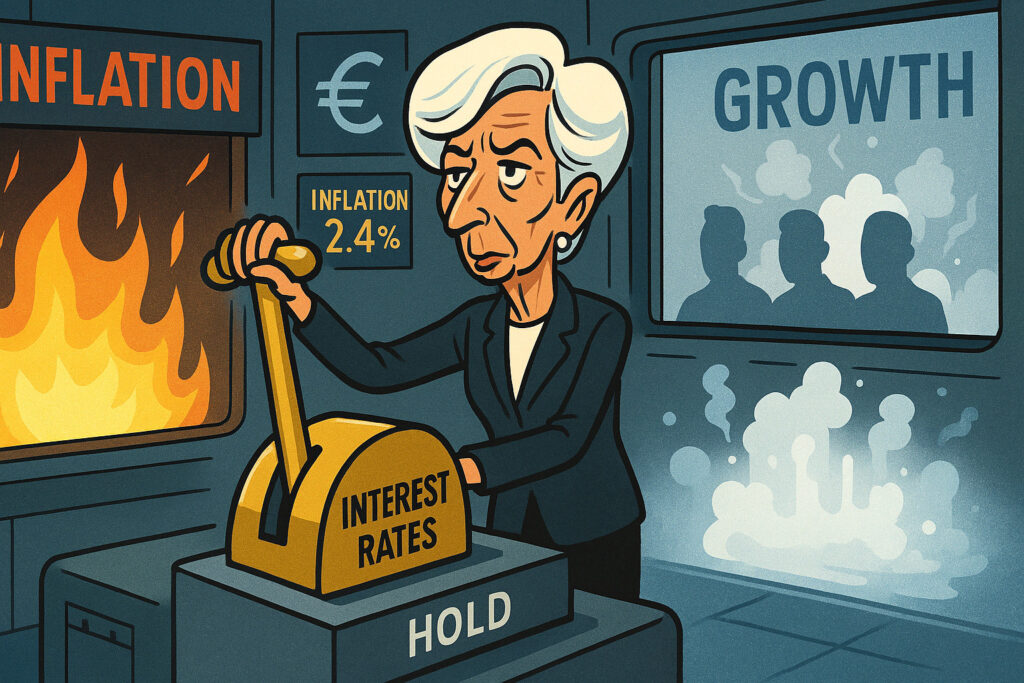Markets digest ECB’s cautious stance as inflation risks and geopolitical tensions loom.
On March 13, 2025, the European Central Bank (ECB) maintained its key interest rates, signaling a cautious approach amid persistent inflation concerns and geopolitical uncertainties. The decision reflects the ECB’s commitment to data-dependent policymaking, balancing the need to support economic growth while ensuring price stability.
Key Policy Decisions and Economic Indicators
The ECB’s Governing Council decided to keep the deposit facility rate at 2.50%, the main refinancing operations rate at 2.65%, and the marginal lending facility rate at 2.90%. This decision follows a series of rate cuts aimed at stimulating the eurozone economy, which has faced headwinds from trade tensions and subdued growth.
Recent economic data indicates that headline inflation in the euro area stood at 2.4% in February, with core inflation—excluding energy and food—at 2.5%. While these figures are closer to the ECB’s 2% target, underlying inflation pressures, particularly in services, remain a concern.
The ECB has revised its GDP growth forecast for 2025 to 0.9%, down from previous estimates, citing factors such as trade disruptions and geopolitical uncertainties. Inflation is projected to average 2.3% in 2025, reflecting both supply-side constraints and demand-side pressures.Latest news & breaking headlines
Market Reaction: Bonds and Equities Respond
Financial markets responded to the ECB’s decision with notable movements:
- German Bunds: The yield on 10-year German bunds rose by 30 basis points, reflecting investor concerns about potential inflationary pressures from increased fiscal spending.Morningstar+1MarketWatch+1
- Euro: The euro appreciated by 0.4%, reaching $1.083, as markets interpreted the ECB’s stance as less dovish than anticipated.
- Equities: European stock indices experienced modest gains, with the DAX and Euro Stoxx 50 rising by 1.2% and 1.1%, respectively, buoyed by expectations of continued monetary support.
Geopolitical Tensions and Fiscal Policies
The ECB’s cautious approach is influenced by ongoing geopolitical tensions, including trade disputes and increased defense spending across Europe. President Christine Lagarde highlighted the “phenomenal uncertainty” facing the global economy, emphasizing the need for flexibility in monetary policy decisions.AP News+4WSJ+4Reuters+4
Germany’s announcement of a €1 trillion investment plan in defense and infrastructure has added complexity to the ECB’s policy considerations. While such fiscal measures can stimulate growth, they also pose risks of fueling inflation, necessitating careful monitoring by the central bank.MarketWatch+1WSJ+1
Forward Guidance: Data-Dependent Path Ahead
The ECB reiterated its commitment to a data-dependent, meeting-by-meeting approach to monetary policy. Future decisions will hinge on incoming economic data, including inflation trends, growth indicators, and the impact of fiscal policies.
The next ECB monetary policy meeting is scheduled for April 17, 2025, where the Governing Council will reassess the economic outlook and determine the appropriate policy stance.
Asset Price Snapshot (as of March 13, 2025):
- EUR/USD: 1.083 (+0.4%)
- 10Y German Bund Yield: 2.10% (+30 bps)
- DAX: 15,300 (+1.2%)
- Euro Stoxx 50: 4,200 (+1.1%)
- Gold: $2,150/oz (-0.5%)
- Bitcoin: $65,000 (+2.0%)
Note: The information provided is based on available data as of March 13, 2025, and is subject to change with future economic developments.
